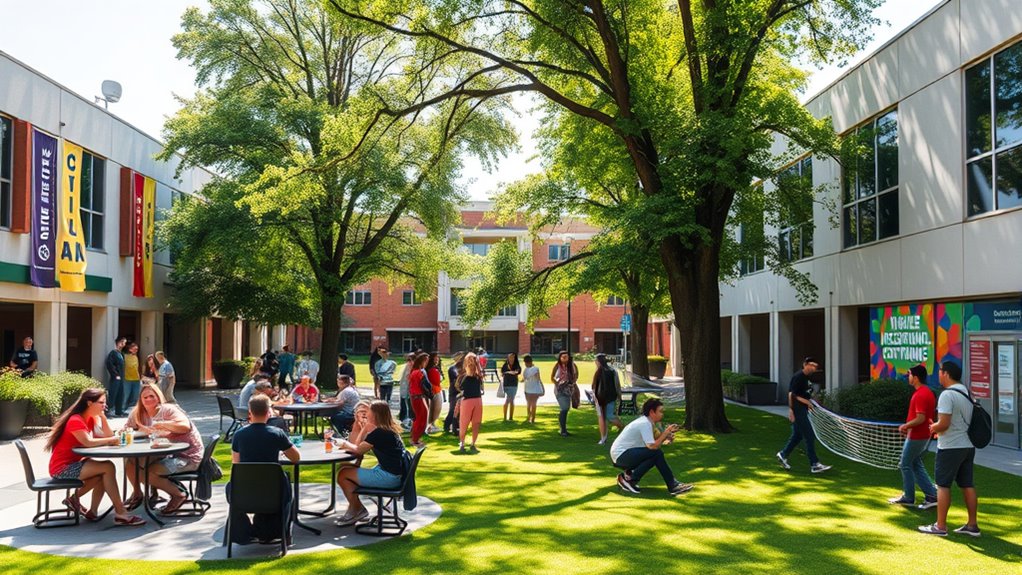You can combat student loneliness by joining social programs like peer mentorship and mental health initiatives. These programs help you connect with others, share concerns openly, and build meaningful relationships. They create a supportive environment where everyone feels valued and understood. Participating in these activities also promotes emotional well-being and reduces feelings of isolation. By engaging with such initiatives, you’ll find ways to make campus life more connected and caring—discover how they can make a difference for you.
Key Takeaways
- Peer mentorship programs foster meaningful connections and reduce feelings of isolation among students.
- Mental health initiatives create safe spaces for open discussions, promoting emotional support and community bonding.
- Support groups and group therapy facilitate peer connections, enhancing a sense of belonging on campus.
- Awareness campaigns and workshops destigmatize mental health, encouraging students to seek help and build resilience.
- Active participation in social programs cultivates a caring campus environment where students feel valued and supported.

Many students feel lonely and disconnected during their academic years, which can negatively impact their mental health and academic performance. To combat these feelings, campuses are increasingly turning to social programs that foster connection and support. Among these initiatives, peer mentorship stands out as a powerful tool. When you participate in peer mentorship programs, you’re not just gaining academic guidance; you’re building relationships with someone who understands what you’re going through. These programs pair students with more experienced peers who can offer advice, encouragement, and a sense of belonging. As a mentee, you get to share your concerns openly, knowing that someone who has faced similar challenges is there to listen. For mentors, it’s an opportunity to develop leadership skills and give back to the student community. Peer mentorship creates a supportive environment where loneliness diminishes because you’re connected to someone who genuinely cares.
Alongside peer mentorship, mental health initiatives play a critical role in addressing student loneliness. These initiatives aim to destigmatize mental health struggles, encouraging students to seek help without fear of judgment. Many campuses host workshops, counseling sessions, and awareness campaigns that focus on emotional well-being. Participating in these events can help you better understand your mental health, learn coping strategies, and realize you’re not alone in your struggles. When mental health is prioritized, students feel more comfortable reaching out for support, which reduces feelings of isolation. Furthermore, some programs incorporate group therapy or support groups that foster peer connections while addressing shared challenges. These group settings allow you to connect with others facing similar issues, strengthening your sense of community and reducing loneliness.
Knowing about privacy policies and the importance of informed consent can also help you feel more comfortable engaging with campus mental health and social programs, as they often involve sharing personal information in a safe and protected environment.
Both peer mentorship and mental health initiatives are designed to create a campus environment where students feel supported and valued. They promote a culture of openness, understanding, and mutual care. When you engage with these programs, you’re taking active steps toward building meaningful relationships and enhancing your mental resilience. These efforts help break down the barriers of loneliness, making your academic journey more fulfilling and manageable. Remember, reaching out through these programs isn’t a sign of weakness; it’s an active move toward a healthier, more connected college experience. By taking advantage of peer mentorship and mental health initiatives, you’re investing in your well-being and creating a support network that can help you navigate both academic and personal challenges. In doing so, you’ll discover that you’re never truly alone when you’re part of a caring community.
Frequently Asked Questions
How Can Students Join Social Programs Easily?
You can join social programs easily by exploring campus resources like student portals or flyers for campus clubs and peer mentorship programs. Attend orientation events or info sessions to learn more and meet organizers. Reach out to peer mentors or club leaders directly—they’re welcoming and enthusiastic to help you get involved. Taking these steps helps you connect, build friendships, and feel more integrated into campus life quickly and comfortably.
Are Virtual Social Programs Effective for Reducing Loneliness?
Virtual engagement acts like a lifeline, connecting you across digital seas. Online communities create safe harbors where loneliness can’t anchor you down. These programs are surprisingly effective, offering real friendships and support despite the screen’s distance. When you participate actively, virtual social programs transform from mere pixels into vibrant gatherings, making you feel less isolated and more connected—proving that even online, genuine bonds can flourish and lift your spirits.
What Funding Sources Support Student Social Initiatives?
You can access funding through various grant opportunities offered by government agencies, private foundations, and educational institutions. To secure these funds, develop partnership strategies with local businesses, non-profits, and community organizations that share your goals. These collaborations increase your chances of obtaining grants and guarantee sustainable support for student social initiatives. By leveraging diverse funding sources and building strong partnerships, you can effectively create and sustain programs that combat student loneliness.
How Do Social Programs Address Diverse Student Needs?
You might wonder how social programs truly meet diverse student needs. They do this through initiatives like peer mentorship, which connects students with relatable guides, and mental health support, offering tailored resources for different challenges. These programs adapt to various backgrounds, ensuring everyone finds a sense of belonging. By focusing on personalized approaches, they create safe spaces where every student feels understood and supported, transforming loneliness into community.
What Are Successful Examples of Student Social Programs?
You can look at successful social programs like peer mentoring and cultural clubs, which foster connections among students. Peer mentoring pairs students for support and guidance, reducing loneliness and building confidence. Cultural clubs celebrate diversity, creating inclusive communities where students feel valued and understood. These programs actively engage students, helping them develop lasting friendships and a sense of belonging, making campus life more welcoming and supportive.
Conclusion
By engaging in social programs, you can banish loneliness from your life faster than you can blink. These programs aren’t just activities—they’re your secret weapon against the overwhelming wave of solitude that threatens to drown you. With every connection you make, you’re building a fortress so strong, no storm of loneliness can ever break through. Embrace these opportunities, and watch loneliness vanish into thin air, replaced by a vibrant, unstoppable community that lifts you higher than you ever imagined.









